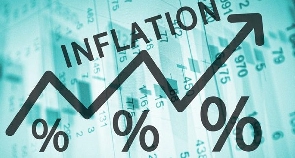The national year-on-year inflation rate was 11.3% in May 2020, which is 0.7 percentage points higher than last month, the Ghana Statistical Service (GSS), has announced.
Month-on-month inflation between April 2020 and May 2020 was 1.7%, the GSS added.
This is lower than the 3.2% recorded between March and April 2020, but higher than the average month-on-month inflation recorded in the months from October 2019 to March 2020 (0.7%).
Only two of the thirteen Divisions had higher than average inflation rates; Food and Non-Alcoholic Beverages and Housing, Water, Electricity, and Gas (both 15.1%).
At the regional level, the overall year-on-year inflation ranged from 3.1% in the Upper East Region to 13.3% in
Greater Accra. When comparing Food to Non-Food inflation, there are clear differences between regions. Ashanti (22.3%) and Western Region (19.8%) had the highest rates of Food inflation, while Eastern Region saw the highest
Non-Food inflation (12.8%). The Upper East, Northern, Eastern, and Volta Regions experienced higher Non-Food than Food inflation, the opposite was true for the other six regions.
The month-on-month inflation rate between regions also differ.
The overall month-on-month inflation was between -1.5% in the Volta Region and 3.9% in the Ashanti Region. The Western Region recorded a month-on-month Food inflation rate of 6.9%, while the Volta Region saw a decrease of -3.3%.
Greater Accra saw an overall month-on-month inflation of 0.7% and a Food month-on-month inflation of -0.4%. See Figure 5, for the other regional month-on-month inflation rates.
The Food and Non-Alcoholic Beverages Division recorded a year-on-year inflation rate of 15.1%. This is 0.7 percentage point higher than April 2020 (14.4%) and 7.2 percentage points higher than the average over the eight months preceding March 2020 (7.9%).
This translates to Food being the predominant driver of year-on-year inflation. Food contributed 58.6% of the year-on-year inflation in April 2020.
Month-on-month Food inflation stood at 2.3%, which is less than the 6.4% that was recorded between March 2020 and April 2020.
The Division with the highest month-on-month inflation between April and March 2020 was Housing, Water, Electricity, and Gas (4.3%).
In the previous two months, the majority of Divisions recorded higher month-on-month inflation rates than the average month-on-month inflation rates between October 2019 and March 2020.
Month-on-month Transport inflation was on average +0.3% between October 2019 and March 2020, but -1.7% between March and April and – 0.6% between April and May. Within the Food Division, Vegetables (34.9%) and Fruits and Nuts (21.5% ) were the Subclasses with the highest rates of inflation.
For the Housing Division, the Subclasses Rents Paid by Tenants (21.0%) and Refuse Collection (48.9%) recorded the highest inflation rates. Month-on-month Transport inflation was negative due to the month-on-month price indices decreases for Diesel (-10.9%) and Petrol (-8.7%).
Click to view details



Business News of Wednesday, 10 June 2020
Source: laudbusiness.com

















